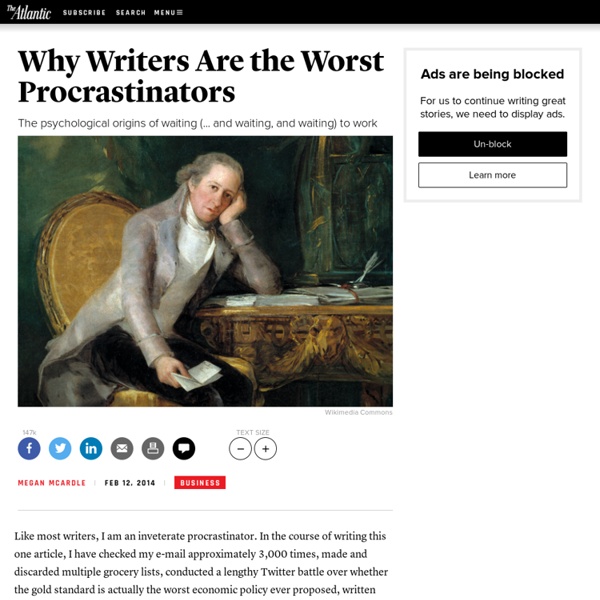Why Writers Are the Worst Procrastinators - Megan McArdle

Google Agenda, le Mac Giver des disponibilités en ligne
Un animateur numérique de territoire, cette nouvelle espèce darwinienne de l’évolution du professionnelus touristicus nous a demandé de lui reparler d’une petite "bidouille" qui permet de proposer à des prestataires sans budget "Gestion des disponibilités en ligne" une solution fort pratique. Nous nous sommes dit que notre réponse aurait largement sa place dans ce blog destiné aux institutionnels du tourisme qui sont en relation avec les prestataires d’hébergements. Je vais donc vous illustrer la mise en place d’un système de disponibilité géré à partir de Google Agenda, service gratuit accesible après création d’un compte Google (par ici). L’idée est de détourner l’usage premier de l’outil Calendrier de Google qui vous permet de suivre de n’importe votre agenda, de créer plusieurs plannings et de les partager avec qui vous voulez, vos collègues… ou vos clients. Etape 1 : Création d’un agenda pour chaque chambre Etape 2 : Créer une réservation express pour la chambre jaune
Écrire pour ne plus se mentir, ou la thérapie des corrections
Les études qui cherchent à prouver les bienfaits d'une pratique régulière d'écriture ne manquent pas : la plupart se centrent sur les effets physiologiques, avec une réduction du taux de stress et un contrôle de la production de cortisol, une hormone générée à l'occasion d'émotions fortes, gênant la récupération. Mais d'autres psychologues assurent que l'essentiel des bienfaits réside dans la perception de soi que favorise l'écriture. (Walt Stoneburner, CC BY 2.0) Les élèves les plus en difficulté de l'université Duke, en Caroline du Nord, ont pu se livrer corps et âme pour une expérience organisée par Timothy D. Wilson, professeur en psychologie à l'université de Virginie. Deux groupes ont été formés, et seul l'un des deux a obtenu des informations sur la scolarité lambda, et le léger décrochage à l'arrivée en faculté, commun à de nombreux étudiants. (via NY Times) Pour approfondir
Mettre les émotions en mots réduit la détresse
Deux expériences utilisant l'imagerie cérébrale (images de l'activité du cerveau) semblent confirmer que mettre les émotions négatives en mots peut réduire la détresse. Dans une première expérience, le psychologue Matthew Lieberman et ses collègues ont provoqué un sentiment de rejet social chez des participants jouant à un jeu d'ordinateur. Les images du cerveau montraient que le sentiment de rejet activait une région nommée cortex cingulé. Cette région est également connue pour s'activer en réponse à la douleur physique. Ils ont aussi observé que les participants dont l'activité dans cette région était moins grande rapportaient moins de détresse et avaient une plus grande activité dans une autre région qui est associée au langage. Selon Lieberman cela suggérait que mettre les émotions en mot pouvait activer cette région du langage, ce qui en retour pouvait réduire l'activité de la région produisant les émotions négatives. Voyez également:
Related:
Related:



